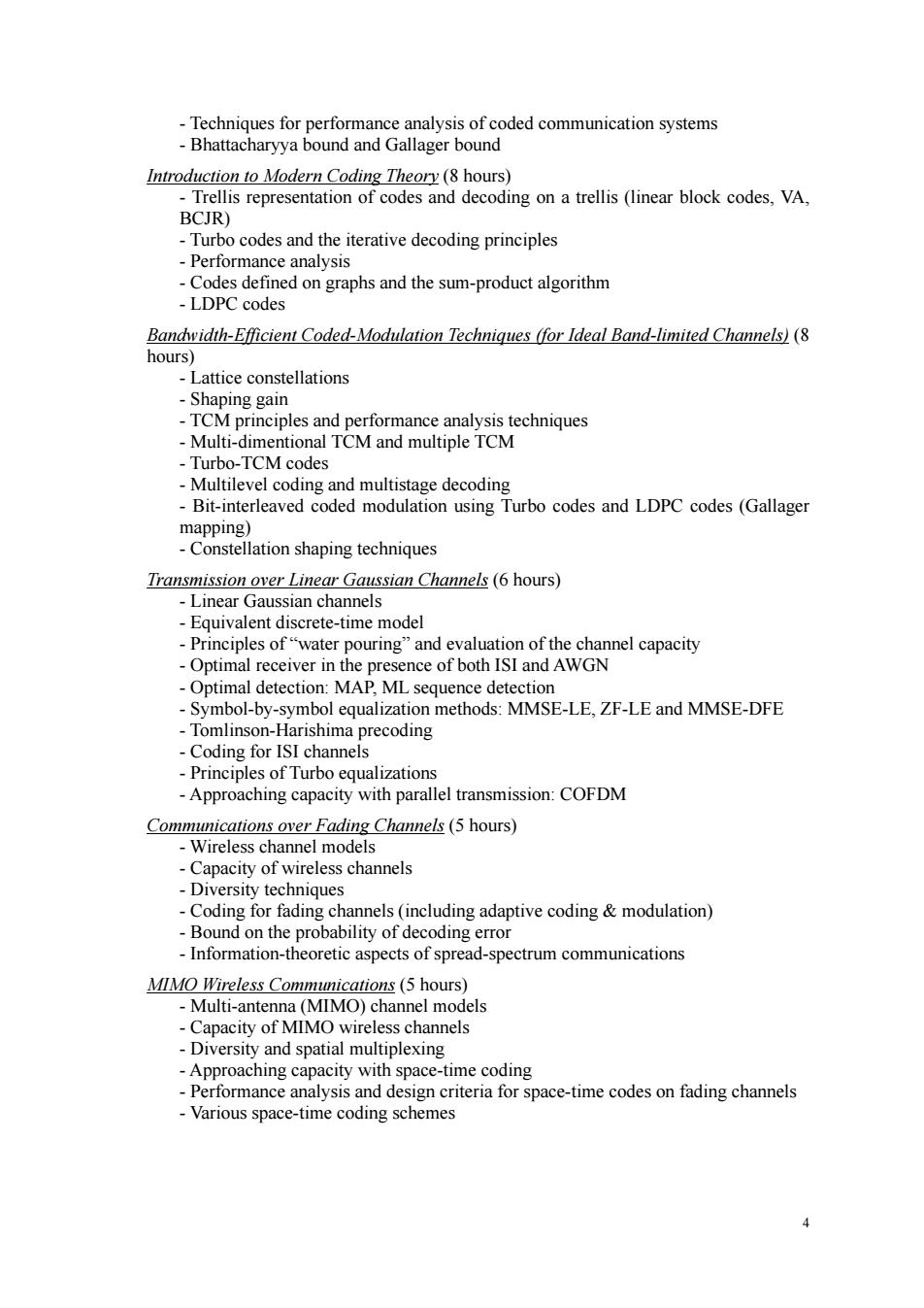正在加载图片...

-Techniques for performance analysis of coded communication systems -Bhattacharyya bound and Gallager bound Introduction to Modern Coding Theory (8 hours) Trellis representation of codes and decoding on a trellis(linear block codes,VA. BCJR) codes and the iterative decoding principles D nce analysis -LDP de ed on graphs and the sum-product algorithm es Bandvidth-Efficient Coded-Modulation Techniques (for Ideal Band-limited Channels)(8 hours) -Lattice constellations Shaping gain -TCM principles and performance analysis techniques Multi-dimentional TCM and multiple TCM -TCM codes ultilevel cod age decoding teeaed codedmodulousin Turbo codes and LDPC codes (Gallager ng a pping llation shaping techniques Transmission over linear gaussian channels (6 hours) -Iinear Gaussian channels -Equivalent discrete-time model -Principles of"water pouring"and evaluation of the channel capacity -Optimal receiver in the presence of both ISI and AWGN Optimal detection:MAP,ML sequence detection Symbol-by-symbol equalization methods:MMSE-LE,ZF-LE and MMSE-DFE Tomlinson-H arishima precoding Coding for ISI channels Principl s of Turbo equalization -Approaching capacity with parallel transmission:COFDM Comn over Fading Channels(5 hours) nel r -Capacity of wireless channels -Diversity techniques -Coding for fading channels(including adaptive coding&modulation) -Bound on the probability of decoding error -Information-theoretic aspects of spread-spectrum communications unications(5 hours) ntenna el models I s cn and spatia I mu plexing ng a ce-t Ce- or space-time codes on fading channels coding sch 44 - Techniques for performance analysis of coded communication systems - Bhattacharyya bound and Gallager bound Introduction to Modern Coding Theory (8 hours) - Trellis representation of codes and decoding on a trellis (linear block codes, VA, BCJR) - Turbo codes and the iterative decoding principles - Performance analysis - Codes defined on graphs and the sum-product algorithm - LDPC codes Bandwidth-Efficient Coded-Modulation Techniques (for Ideal Band-limited Channels) (8 hours) - Lattice constellations - Shaping gain - TCM principles and performance analysis techniques - Multi-dimentional TCM and multiple TCM - Turbo-TCM codes - Multilevel coding and multistage decoding - Bit-interleaved coded modulation using Turbo codes and LDPC codes (Gallager mapping) - Constellation shaping techniques Transmission over Linear Gaussian Channels (6 hours) - Linear Gaussian channels - Equivalent discrete-time model - Principles of “water pouring” and evaluation of the channel capacity - Optimal receiver in the presence of both ISI and AWGN - Optimal detection: MAP, ML sequence detection - Symbol-by-symbol equalization methods: MMSE-LE, ZF-LE and MMSE-DFE - Tomlinson-Harishima precoding - Coding for ISI channels - Principles of Turbo equalizations - Approaching capacity with parallel transmission: COFDM Communications over Fading Channels (5 hours) - Wireless channel models - Capacity of wireless channels - Diversity techniques - Coding for fading channels (including adaptive coding & modulation) - Bound on the probability of decoding error - Information-theoretic aspects of spread-spectrum communications MIMO Wireless Communications (5 hours) - Multi-antenna (MIMO) channel models - Capacity of MIMO wireless channels - Diversity and spatial multiplexing - Approaching capacity with space-time coding - Performance analysis and design criteria for space-time codes on fading channels - Various space-time coding schemes